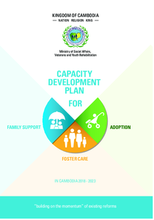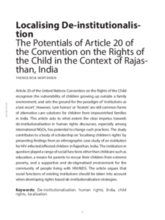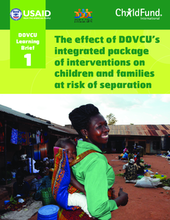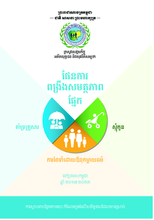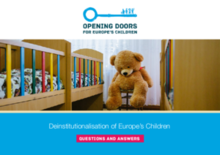Displaying 451 - 460 of 1025
This Plan presents key findings and 23 recommendations, sub-divided into short-term, medium-term and long-term actions, for an effective and efficient implementation of foster care, adoption and family support in Cambodia.
This study contributes to a body of scholarship on ‘localising children’s rights’ by presenting findings from an ethnographic case study of an institution for HIV-infected/affected children in Rajasthan, India.
This learning brief analyzes quantitative data from the first of the project’s stated objectives: examining the extent to which “Deinstitutionalization of Orphans and Vulnerable Children in Uganda” (DOVCU) project interventions decrease vulnerabilities for households and children at risk of separation.
In 2017, the USAID Displaced Children and Orphans Fund (DCOF) of the United States Agency for International Development (USAID) engaged the USAID-funded MEASURE Evaluation to build on and reinforce progress in advancing national efforts on behalf of children who lack adequate family-based care in Uganda.
‘Prepare for Leaving Care – A Child Protection System that Works for Professionals and Young People’, a two-year project co-funded by the Rights, Equality and Citizenship (REC) Programme of the European Union (2017-2018), aims to ensure that the rights of young people in alternative care are respected and that they are prepared for an independent life.
This paper offers an overview of residential care for children in Japan and its ongoing development.
This Plan presents key findings and 23 recommendations, sub-divided into short-term, medium-term and long-term actions, for an effective and efficient implementation of foster care, adoption and family support in Cambodia.
To accompany the release of the learning guide “Deinstitutionalisation of Europe’s Children: Questions and Answers”, the Opening Doors for Europe’s Children has prepared an online quiz to test the knowledge and tackle some of the tricky questions on deinstitutionalisation (DI).
In this video, Catholic Relief Services, Lumos, and Maestral International presented their project: Changing the Way We Care, a project aimed at ending the institutionalization of children.
This resource provides quick answers to some of the frequently asked questions about the transition from institutional to family- and community-based care for children, also known as deinstitutionalisation (DI).

